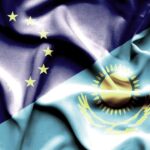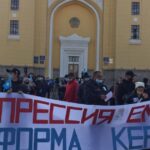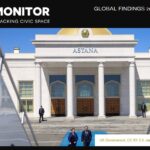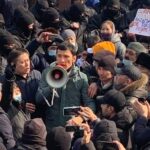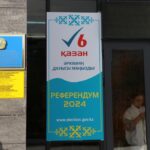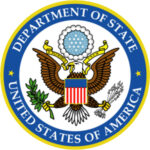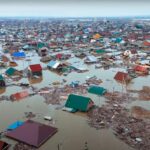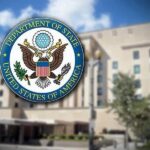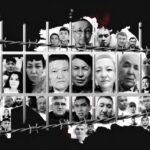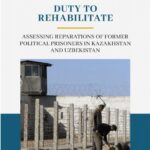Executive Summary:
Kazakhstan’s political stability and rising economic prosperity belie deeply undemocratic practices that have become fixed in the country’s post-Soviet existence. These undemocratic practices were on clear display in 2012.
In January, Kazakhstan’s government mobilized its administrative and propaganda machine to hold parliamentary elections that further entrenched the power of President Nursultan Nazarbayev and his ruling Nur Otan party. After the vote, in which two satellite parties of Nur Otan won just a handful of seats, regime supporters countered criticisms of election monitors from the Organization for Security and Cooperation in Europe’s Office for Democratic Institutions and Human Rights (OSCE/ODIHR) by praising Kazakhstan’s “evolving democracy.” Then, through a yearlong crackdown on the country’s political opposition, independent media, and civil society, the regime sought to demonstrate that it enjoys popular support and is the sole guarantor of national security. Authorities also continued to describe labor protests that ended with police firing on striking oil workers and their supporters in December 2011 in the western town of Zhanaozen as the work of “third forces” manipulated by the political opposition. In a series of unjust trials, the government convicted dozens of activists and workers for instigating violence in Zhanaozen, including Vladimir Kozlov, head of the unregistered opposition political party, Alga.
There is intense speculation in Kazakhstan as to how much day-to-day control 72-year-old President Nazarbayev exerts and what mechanisms of succession, if any, are in place. The delivery of political stability and rising prosperity to its people is aided by the country’s enormous resource wealth and long tradition of multiethnic cooperation. Officially named “Leader of the Nation” in 2010, Nazarbayev has been in office for more than 20 years, since just prior to Kazakhstan’s independence. Aided by the country’s enormous resource wealth and long tradition of multiethnic cooperation, Nazarbayev takes credit for Kazakhstan’s stability and development, insisting that growth must come before liberalization. He enjoys unlimited special powers under the country’s constitution, including immunity from prosecution, freedom from term limits, and the right to nominate his successors and advise them. The government’s ceaseless propaganda campaigns, broadcast by a tightly regulated media, reinforce Nazarbayev’s carefully crafted image and political message, discrediting any potential alternatives to his leadership. His regime tolerates widespread corruption and keeps tight control on political appointments at all levels of governance. Recent shuffling of officials in Astana, Kazakhstan’s capital, and some of the country’s regions suggests restructuring due to intra-elite tension without any immediate or future democratizing implications.
National Democratic Governance. Under President Nazarbayev’s government, Kazakhstan has mastered the rhetoric of reform and democratization to establish a favorable image in the West without demonstrating a genuine commitment to these processes. Various business groups depend on Nazarbayev’s patronage and indirectly control the parliament, government ministries, and major media outlets, while Nazarbayev himself appoints individuals to a range of top offices. In 2012, he rearranged several key officials in Astana, including the prime minister and head of the Presidential Administration. The country’s military and security services also experienced a crisis of leadership after a series of violent incidents. Kazakhstan’s rating for national democratic governance remains unchanged at 6.75.
Electoral Process. In the run-up to the January 2012 parliamentary elections, the government blamed Kazakhstan’s political opposition for instigating the violence in Zhanaozen. Although OSCE/ODIHR monitors declared that the election “did not meet key democratic principles,” Kazakhstan’s national media as well as diplomats and lobbyists working to elevate the country’s prestige abroad praised the vote for ensuring a multiparty parliament. In reality, the only two parties other than Nur Otan that crossed the 7 percent barrier required for representation are loyal to President Nazarbayev. Due to the absence of any substantive change despite some token reforms, Kazakhstan’s rating for electoral process remains unchanged at 6.75.
Civil Society. The space for independent activism and public debate shrank in 2012, as the government continued to coopt nongovernmental organizations (NGOs), businesses, and public associations into the state sphere. A law adopted in January 2012 to protect “national security” further strengthens state regulation of the civic sphere by making it easier to monitor political opponents, labor activists, and other independently minded individuals. The measure also compounded the effects of existing restrictions on the right to assembly and other democratic guarantees, as well as the registration of religious and other NGOs. Due to its inadequate and unjust response to Zhanaozen and the enactment of measures further limiting the activity of genuinely free associations and activities, Kazakhstan’s rating for civil society worsens from 6.00 to 6.25.
Independent Media. The media sphere is largely under the control of business groups affiliated with the ruling regime. The government also employs propaganda and technology to regulate the media and saturate Kazakhstan’s informational space with progovernment views that seek to discredit independent voices. In 2012, the regime banned about 40 of the country’s few surviving independent media outlets for publishing “extremist” content. Many of these outlets were funded by opposition figures. Criticism of Nazarbayev and other top figures remains a criminal offense, and the government seeks to enhance its international profile by controlling information on the internet and engaging foreign communications firms. Kazakhstan’s independent media rating remains unchanged at 6.75.
Local Democratic Governance. President Nazarbayev maintains full authority over appointing the heads (akims) of all regions and districts and resists demands to introduce local elections. Notwithstanding this centralized system, the government scrambled in 2012 to establish effective control over regional administrations in order to respond to instability and manage corruption. Nazarbayev’s regime dismissed multiple regional and local leaders in the oil-rich regions of Atyrau and Mangistau, where Zhanaozen is located. Kazakhstan’s rating for local democratic governance remains 6.50.
Judicial Framework and Independence. Kazakhstan’s judiciary is loyal to the regime and protects the interests of the state rather than those of individuals, minorities, and the weaker strata of society. In 2012, the judiciary convicted dozens of civil society activists, oil workers, police officers, and regional administrators, as well as opposition leader Vladimir Kozlov, on politically motivated charges of fomenting unrest in Zhanaozen. There were widespread reports that torture, ill treatment, and other unlawful actions were utilized in the trials. No high-level government officials were investigated or tried for their involvement in the violence. Due to the continuing compliance of the judiciary with the interests of the regime, Kazakhstan’s judicial framework and independence rating remains unchanged at 6.50.
Corruption. Corruption is systemic in Kazakhstan and benefits ruling elites. Investigations are handled by the presidentially appointed prosecutor general and financial police (FinPol) in conjunction with the Ministries of Justice and Internal Affairs and the National Security Committee (KNB). These entities press corruption charges against critics of the government, including political opponents, journalists, and NGOs. High-level officials typically only face charges after they have fallen out of favor with the regime. In 2012, multiple administrators in Atyrau were sacked and investigated for misappropriating more than $100 million, and the country’s prosecutor general stepped in to dismiss the regional prosecutor for his slow-footed response to the scandal. In addition, the regime continued to pursue corruption charges against former officials who have fled the country. Kazakhstan’s corruption rating remains unchanged at 6.50.
Outlook for 2013. Kazakhstan’s government takes credit for delivering stability and prosperity, despite its resistance to meaningful political reform and crackdowns on virtually all opposition to President Nazarbayev’s rule. In the near future, the regime will likely introduce more top-down measures to further assert its dominance at all levels of governance. Given the regime’s tight grip on both political and economic interests, many citizens will also likely continue to view loyalty to the president as the best means of seeking advancement for themselves and their families.
Yet Kazakhstan’s governmental system, situated around a single person and his political party, may be approaching a saturation point. The regime’s refusal to liberalize, constant displays of devotion to Nazarbayev and his legacy as the “First President,” widespread patronage networks, and control over various leadership appointments have made political parties, the parliament, and other institutions in the country seem increasingly irrelevant. As the question of who will take power after Nazarbayev dies or leaves office continues to gain momentum, the hollow narrative about a strong, prosperous, and democratizing Kazakhstan will face new pressures and critiques, particularly from members of the country’s rising middle class who want guarantees rooted in the rule of law.
National Democratic Governance:
President Nursultan Nazarbayev has placed Kazakhstan on a path of socioeconomic modernization, thanks in large part to the country’s enormous resource wealth. In theory, this modernization should produce conditions favorable to democracy. However, the government’s unrelenting drive to consolidate control over both resources and institutions means that Nazarbayev and a small number of individuals and groups enjoying his patronage continue to thwart democratic development. Government propaganda reinforces Nazarbayev’s cult of personality, masking growing speculation and anxiety about presidential succession.
Kazakhstan’s political system is a hybrid of Soviet-era institutions and practices with an elected parliament dominated by a single party (Nur Otan). This apparatus hinges on the personality and backing of Nazarbayev. Under the constitution, Nazarbayev has sweeping authority over the parliament, which is comprised of the Senate (the upper house) and the Mazhilis (the lower house). He appoints one-third of the Senate and may unilaterally dissolve the parliament. He also selects all members of the Assembly of the People of Kazakhstan (APK), a body representing ethnic minorities, and places nine of them in the Mazhilis. The remaining 98 members of the Mazhilis are elected from party lists on a proportional basis. The additional senators are selected by the assemblies of the 14 regions, the capital Astana, and the former capital Almaty. Nazarbayev also selects the chair and two of the seven members of the Central Election Commission (CEC).
The president appoints and may dismiss the prime minister, who is mainly a technocrat, in charge of executing policies rather than formulating them. Despite this fact, former prime minister Karim Masimov, who served from 2007 until mid-2012, accumulated considerable personal influence and wealth during his tenure. His recent promotion by Nazarbayev to the head of the Presidential Administration allows him to wield greater political power, although he remains a staunch presidential loyalist. Masimov’s former deputy, Serik Akhmetov, succeeded him as prime minister. Akhmetov had served previously as the head (akim) of Karaganda province, the minister of transport and communication, and the first deputy mayor of Astana.
Several powerful business groups loyal to Nazarbayev and Nur Otan indirectly control the parliament, government ministries, and major media outlets. These groups include the copper giant Kazakhmys; the “Eurasia Group” (Eurasian Natural Resources Corporation, or ENRC); and the sovereign wealth fund Samruk-Kazyna, effectively run by Nazarbayev’s son-in-law, Timur Kulibayev, and former Prime Minister Masimov. Kulibayev, who was once seen as a possible successor to Nazarbayev, has kept a low public profile since his removal in December 2011 as Samruk-Kazyna’s chairman following the events in Zhanaozen, where labor strikes targeted the Samruk-Kazyna subsidiary KazMunaiGaz (KMG). Yet Kulibayev remains powerful: His removal was largely an effort to appease public opinion, and in addition to his continued influence at Samruk-Kazyna, Kulibayev holds key posts in the National Economic Chamber (Soyuz Atameken), Kazenergy, and Russia’s Gazprom.[1]
These and other business entities have allowed personal associates of Nazarbayev to amass vast personal wealth. Among these associates are Vladimir Kim, the CEO of Kazakhmys, and Alizhan Ibragimov, a major shareholder in ENRC. Both men, along with mining, hotel, and banking magnate Bulat Utemuratov, were included on the 2012 list of world billionaires in Forbes magazine.[2]
Kazakhstan’s military and security services, which are led by still more Nazarbayev associates, experienced considerable turnover in 2012 after the Zhanaozen crackdown and other violent incidents. The discovery in May of the charred bodies of 14 guards near Kazakhstan’s border with China led to the arrest of Vladimir Chelakh, a 19-year-old military conscript. Chelakh was sentenced to life imprisonment after a trial that some observers considered dubious.[3] The massacre sparked an immediate purge within the Kazakh Border Service and the resignation of its leader, Major General Nurzhan Myrzaliev. The death of his successor, Colonel Turganbek Stambekov, in a military transport plane crash in December has deepened the leadership crisis within the border service, which has long suffered from a deficit of autonomy and expertise, and has been criticized for condoning corruption and illegal practices, especially along the Kazakhstan-China border. The border service operates under the supervision of the National Security Committee (KNB) and is headed by the deputy chairman of the KNB, who is, appointed by the president.[4]
Kazakhstan’s major business groups and influential individuals like Masimov, Akhmetov, the chairman of the Senate (who, according to the constitution, will succeed Nazarbayev in the event of his removal or death), and the head of the KNB are likely to have a decisive say in shaping the balance of forces in a post-Nazarbayev Kazakhstan.
Electoral Process:
Kazakhstan regularly holds parliamentary and presidential elections, but to date, none has qualified as free or fair according to international standards. The 16 January 2012 parliamentary elections were no exception, despite a supposed goal of creating a multiparty legislature. Nazarbayev’s government held the elections ahead of schedule and on short notice, allowing very little time for already marginalized opposition parties to organize themselves. The government also mobilized its security apparatus, tightly monitored the media, launched verbal attacks against the opposition, and accused various “third forces” in exile or otherwise located abroad of instigating the violence in Zhanaozen.
A central aim of the vote was to rectify the outcome of the 2007 parliamentary elections, in which Nur Otan won every legislative seat. In response to criticism, Kazakhstan amended its electoral law in 2009 to state that at least two parties must be represented in the parliament. Previously, only parties surpassing 7 percent of the vote could hold seats. According to the amended law, this threshold remains, but the second-place party must hold seats no matter the percentage of the vote that it received.[5] To maintain its grip on the parliament, Nur Otan began grooming propresidential parties to serve as the authorized electoral opposition. In 2011, parliamentary deputy Azat Peruashev, who has close ties with Timur Kulibayev and the Eurasia Group, resigned his membership of Nur Otan and took over Ak Zhol, a party that had previously maintained genuine ties with the political opposition despite being loyal to the regime. Peruashev has revamped Ak Zhol as a party of entrepreneurs and cemented its status as a satellite of Nur Otan.[6]
In the 16 January snap elections, which Nazarbayev called for only two months prior, a total of seven parties ran for seats. Nur Otan received 80.9 percent of vote and obtained 83 seats. Ak Zhol won 7.5 percent of the vote and eight seats. A third proregime party, the Communist People’s Party of Kazakhstan (KNPK), also eked over the 7 percent threshold and won seven seats. The National Social Democratic Party (OSDP), the only party running in the elections that could be described as real opposition, won 1.68 percent of the vote.[7] Its key candidate, Bolat Abilov, was disqualified from the process just days before the election for filling out a personal income form incorrectly. Another opposition party, Alga, was not allowed to run. It has been denied formal registration with the government since 2005.
There was controversy prior to the election over whether citizens in Zhanaozen should be allowed to vote. In early January, the Constitutional Court decreed that voting should not take place, given that the town remained under emergency laws and the effective control of the military. Opposition figures warned that the government wanted to prevent a vote because it feared a protest against its handling of the recent labor strikes and police violence. The government quietly overturned the court’s decision prior to the election, announcing the move in an online statement.[8]
Ultimately, the monitoring mission of the Organization for Security and Cooperation in Europe’s Office for Democratic Institutions and Human Rights (OSCE/ODIHR) declared that the parliamentary vote, “though well-administered, did not meet key democratic principles.”[9] An OSCE/ODIHR report, along with a video by Radio Free Europe/Radio Liberty[10] and online postings by independent election monitors and ordinary citizens, documented widespread ballot stuffing. However, the Office of the Prosecutor General dismissed the evidence as a provocation by unspecified political forces. Nazarbayev also attacked the OSCE/ODIHR as having become an organ “for putting pressure by one group of countries on another” and questioned a “mythical unconformity with standards of some sort.” He threatened to ban “experts hired by someone who criticize our elections.”[11] Kazakhstan served as chair of the OSCE in 2010.
On the international stage, Kazakhstani diplomats and lobbyists hailed the elections as proof that Kazakhstan is an “evolving democracy” in an unstable region. In an effort to discredit the OSCE/ODIHR, they cited more positive assessments issued by other organizations, notably those of the Shanghai Cooperation Organization (SCO), Commonwealth of Independent States (CIS), Parliamentary Assembly of Turkic-speaking Countries (TURKPA), and several “independent,” foreign delegations, which in reality were invited or welcomed by Nazarbayev’s government in order to provide favorable assessments.[12]
The parliamentary elections indicate that substantial obstacles remain in the way of organizing free, fair, and competitive elections in Kazakhstan. These include Nazarbayev’s widespread patronage and the government’s abuse of administrative resources, as well as the lack of independent institutions, including the Central Election Commission (CEC), the judiciary, the Constitutional Court (which should be able to adjudicate cases of electoral dispute), and the media.
Civil Society:
The space for independent activism by nongovernmental organizations (NGOs) and public associations—particularly those engaged in advocacy for civil liberties, labor rights, and political reform—shrank further in 2012. Throughout the year, the authorities pursued charges against people deemed responsible for the Zhanaozen oil strike and the violence that erupted in December 2011. Adding to a raft of recent legislative measures targeting independent political and civil society activity, in early January President Nazarbayev signed into law a new measure that claims to safeguard “national security” by effectively criminalizing the spread of any information government authorities deem harmful or false.[13]
All NGOs, public associations, and religious bodies are required to register with the Ministry of Justice. Through funding and programming, the government seeks to coopt nascent civil society organizations and define their agendas as proregime. No more than about 200 of the country’s 5,000 registered NGOs are able to make a positive impact, and they are subjected to surveillance by the KNB and the Office of the Prosecutor General. Tightened monitoring in 2012 also made it more difficult for private businesses quietly funded by civil rights advocacy groups and independent media channels to safeguard their interests and carve out a sphere of activity free from governmental control.
The 2011 Zhanaozen violence and its aftermath consumed the energies of the judicial system in 2012. When oil workers began striking for wage increases in May 2011, the story made international headlines, causing significant embarrassment to the regime. The December violence, in which police opened fire on protestors, was captured on video and sparked public outrage. The government responded with a harsh security clampdown in the surrounding area. The official death toll was 15, with about 100 injuries; some alleged eyewitnesses claimed higher casualties. In 2012, the government used all the repressive legislation at its disposal to target those it held responsible for the strikes, the violence, and the spread of information about both.
In June, the courts sentenced 34 Zhanaozen residents and labor activists for “organizing mass disorders.”[14] Four months later, opposition leader Vladimir Kozlov and two other defendants, Akzhanat Aminov and Serik Sapargali, were convicted of “inciting social hatred” in connection with Zhanaozen.[15] In December, the government officially banned Kozlov’s party Alga for “extremist” activities.[16]
A new national security law introduced in 2011 but signed into law in January 2012 makes “damaging the image of Kazakhstan abroad” a criminal offense and punishes individuals who “influence public and individual consciousness” with the distribution of “distorted” and “unreliable” information “to the detriment of national security.”[17] The law may make it easier for the government to target opposition and civil society activists, including those traveling to brief international organizations and foreign governments on the Zhanaozen violence.
Still, some members of Kazakhstan’s civil society, with support from international human rights groups, were able to promote their concerns and demands. A group of activists compiled a list of 40 government officials “involved in the Zhanaozen massacre.” The “Zhanaozen list,” which was accompanied by an open letter, includes former prime minister Masimov; his predecessor at the helm of the Presidential Administration, Aslan Musin; Minister of Internal Affairs Kalmukhanbet Kasymov; Attorney General Askhat Daulbayev, Chairman of the KNB Nurtai Abykayev; and President Nazarbayev himself. The authors of the list, which was published in a U.S. newspaper in October with sponsorship from the Human Rights Foundation, urged Western governments to impose a travel ban on the named officials.[18] Meanwhile, a September 2012 report by Human Rights Watch (HRW) detailed allegations of intimidation and imprisonment of union leaders and strikers in Zhanaozen. Such actions place Kazakhstan in violation of international human rights commitments, International Labor Organization (ILO) standards, and national legislation.[19]
To counter its critics, Nazarbayev’s government blamed “third forces,” including opposition figures in exile, for fomenting the violence in Zhanaozen in order to tarnish Kazakhstan’s reputation. Proregime lobbyists also sought to promote a contrasting, positive image of Kazakhstan as a dynamic economy and young democracy. Alexander Mirtchev of Krull Corp., a global strategy and solutions provider, is one of the several such lobbyists identified by the opposition. Mirtchev has close ties with various Kazakhstani policymakers.[20] Lawyers representing Mirtchev have threatened to sue the Human Rights Foundation for defamation because it helped publish the “Zhanaozen list,” which made mention of Mirtchev’s lobbying efforts.[21]
In 2012, the government also maintained constraints on religious organizations whose views are not in line with the state-approved version of Islam. The regime implemented a controversial law adopted in October 2011 that bans unregistered religious activities; prohibits the provision of prayer rooms inside state buildings; prevents foreigners from setting up faith groups; and severely limits acquisition of what it defines as “religious literature.” The law also gave all religious groups one year to re-register with authorities under stringent new criteria. Currently, about one-third of the country’s religious associations are facing closure after failing to meet the reregistration deadline.[22] In addition, the official categorization of various minority religions as “sects” or “non-traditional” groups continues to portray them as potentially subversive or extremist. These groups include Evangelical Christians, Jehovah’s Witnesses, Hare Krishna devotees, and independent Muslims. In contrast, the Spiritual Association of Muslims in Kazakhstan works closely with the government to regulate Islam by licensing the activities of the country’s mosques, conducting background checks on imams, and serving other managerial functions.[23]
Public gatherings in Kazakhstan remain tightly restricted. The Law on Public Assembly, in effect since 1995, requires permission from the government ten days in advance for any public appearance or gathering broadly seen as an assembly. Permission is typically granted only to progovernment parties and associations. Negative propaganda depicting public demonstrations and rallies as harbingers of disorder often dissuade citizens from organizing or taking part in any civic action.
Independent Media:
Most media outlets in Kazakhstan, although privately owned and formally categorized as independent, are regulated by the government and controlled by financial groups affiliated with the regime. They refrain from investigative work that might negatively affect the interests or reputations of President Nazarbayev and his inner circle. In 2012, the Office of the Prosecutor General banned about 40 of the country’s few remaining independent media outlets, most of which are owned or financed by opposition figures. Among the banned outlets were many that had been critical of the government in their coverage of the violence in Zhanaozen, such as the newspaper Respublika, Stan-TV, and K-Plus, a satellite network financially supported by exiled ex-minister-turned-opposition-leader Mukhtar Ablyazov.[24]
The government countered media criticism of its handling of Zhanaozen with heavy-handed and strategically timed propaganda. Just one day before an appeal hearing in Vladimir Kozlov’s trial, in which he was convicted of allegedly fomenting unrest in Zhanaozen, state-controlled Khabar TV broadcast a documentary entitled “Money for blood: Their weapons are dirty games and provocations, their business is unrest and social conflicts” that portrayed Kozlov as a criminal.[25] The program condemned a handful of other individuals, too, including Ablyazov; Muratbek Ketebayev, a member of Kozlov’s Alga party and a supporter of independent media; and Irina Petrushova, editor of Respublika.[26]
Daniyar Moldashev, the editor of the newspaper Golos Respubliki, was repeatedly questioned about his alleged financial ties to Kozlov, Alga, and the events in Zhanaozen.[27] His brother Askar Moldashev was arrested on fabricated drug possession charges.[28]
Officials use a mix of highly restrictive laws and unauthorized, indirect, and informal mechanisms of control to ensure the media’s subordination to Nazarbayev’s regime. Article 318 of the criminal code penalizes a person who “insults the honor and dignity of the president” and is used routinely to prosecute independent journalists. In 2012, the government began enforcing a measure requiring all foreign television and radio stations to re-register with the government, which will potentially restrict foreign media outlets’ operation.[29] Another recently enacted law requires media channels to produce at least 50 percent of their programming in Kazakh, rather than translating programs into Kazakh, as had previously been common practice. The national TV channel Qazaqstan (formerly known as Kazakhstan-1) completed its switch to all-Kazakh programming in 2012.
The government also continues to seek to control information online by way of propaganda and technology. The state-owned Kazakhtelecom and its subsidiaries have a monopoly on internet service provision, and they have helped the government block access to opposition websites. Authorities have been accused of doctoring Kazakhstan-related entries on Wikipedia. Moreover, the well-funded website Wikibilim.kz, billed as the Kazakh-language Wikipedia, has posted articles portraying Nazarbayev favorably and downplaying or ignoring the events in Zhanaozen.[30] Wikipedia founder Jimmy Wales was criticized in 2012 for “cheerleading” when he described Wikibilim.kz as “not politicized.”[31] It is estimated that one-third of Kazakhstan’s population makes regular use of the internet.[32]
The government has engaged multiple public relations firms to highlight its achievements, whether legitimate or exaggerated, and counter criticisms abroad. Among these firms are Tony Blair Associates, BGR Gabara, Portland Communications, and Media Consulta.[33] The regime and its supporters have also recruited a number of Western academics, media figures, and writers to burnish the country’s image. In March 2012, author Jonathan Aitken published Kazakhstan: Surprises and Stereotypes After 20 Years of Independence, a benign account of Kazakhstan based on more than 35 hours of one-on-one interviews with President Nazarbayev. This book, along with Nazarbayev and the Making of Kazakhstan: From Communism to Capitalism, which Aitken wrote in 2009, are bought wholesale by the government for free distribution to foreigners viewed as potentially useful assets in shaping Kazakhstan’s international profile.[34]
Local Democratic Governance:
Resisting demands for decentralization and local elections, Nazarbayev’s regime has preserved a unitary administrative framework in which all regional and local heads (akims) are appointed by the president. Meanwhile, legislative councils (maslihats) are elected to represent their constituencies but in practice merely rubber stamp acts formulated by local, regime-appointed executives. To further exert control, Nazarbayev has continually shuffled akims, not allowing them to spend more than a few years in office and rewarding them with a better position for their compliance.
Notwithstanding this centralized system, Nazarbayev’s government scrambled in 2012 to establish effective control over some regional administrations. In particular, the oil-producing regions of Mangistau, where Zhanaozen is located, and Atyrau were the focus of scrutiny and of purges or reassignments of top-level officials. Several Mangistau administrators, police chiefs, and public figures were sacked after the events in Zhanaozen. Similarly, a number of officials in Atyrau were dismissed and investigated on suspicion of corruption, including regional akim Bergay Ryskaliev, his brother, and his deputy. In addition, Aslan Musin, who hails from Atyrau and was thus informally tasked with overseeing his region’s officials, was demoted in Astana from leader of the Presidential Administration to the head of Kazakhstan’s Accounts Committee.
Opposition activists have advocated for direct election of akims to increase their autonomy and legitimacy. However, given the regime’s patronage network, local candidates still could not contest elections without top-down interference, and the maslihats would still lack power and autonomy. Moreover, members of the CEC and district election commissions would remain presidential appointees.
A further constraint on the authority and effectiveness of local bodies is their lack of financial autonomy. The central government determines all taxation rates and budgetary regulations. Local budgets lose substantial sums, as many companies operating in the regions are registered in Almaty or Astana and do not pay taxes locally. There is also no effective mechanism for sharing revenues among regions.[35] The akim’s standing and the region’s revenue-generating capacity also influence the extent to which a regional administration may retain collected taxes. For instance, the akims in oil-rich regions and in Astana and Almaty, which have attracted the most foreign investment, tend to exert greater control than other regional heads over budgetary matters.
The consequences of weak and unbalanced local authority are borne by the Kazakhstani people. The labor unrest in Zhanaozen highlighted the enormous disparity between profits accrued by private oil companies and the living standards of people in oil-rich territories, which have among the highest poverty rates in the country. In other areas, inadequate employment and infrastructure have led to massive emigration to regional urban centers, as well as to Almaty and Astana. The social and legal marginalization of internal migrants and ethnic Kazakh returnees (oralman) from abroad is a growing and unaddressed challenge for authorities.
Judicial Framework and Independence:
Although Kazakhstan’s constitution recognizes the separation of powers and safeguards the independence of the judiciary, in practice the courts are subservient to the executive and protect the interests of the ruling elite. The president appoints judges to the Supreme Court and local courts, as well as members of the Supreme Judicial Council. The courts regularly convict public figures brought to trial on politically motivated charges, usually without credible evidence or proper procedures. In 2012, the judiciary toed the government’s line in responding to the violence in Zhanaozen, convicting dozens of regime opponents, labor leaders, workers, police, and regional administrators while failing to seriously investigate or try any high-level officials.
One of the judiciary’s main targets in 2012 was Vladimir Kozlov, leader of the opposition party Alga. Kozlov, who had predicted the government would blame the opposition for the violence in Zhanozen, was arrested in January. He was detained until August, when his trial began with co-defendants Serik Sapargali, another opposition figure, and Akzhanat Aminov, a labor activist. Kozlov was charged with inciting social discord, calling for overthrow of the government, and leading a criminal group. The trial was marred by multiple rights violations, including an incomplete investigation, incoherent charges, possibly falsified testimony, unexplained refusals of defense requests, and the use of psychological pressure against Kozlov. On 8 October, Kozlov received a seven-and-a-half year-prison sentence, while Sapargali and Aminov received suspended sentences.[36]
Other legal proceedings in the wake of Zhanaozen produced further proregime convictions. In a trial that ended in June and involved torture and ill-treatment in obtaining testimony, a court found 34 oil workers guilty of “organizing and participating in mass unrest” and of theft. Thirteen of the convicted were sentenced to prison.[37] A court in Mangistau considered the convictions on appeal in an accelerated process and in the absence of those convicted. Only one of the workers, Roza Tuletayeva, had her seven-year sentence reduced to five years. This occurred after she agreed, presumably under duress, to testify against Kozlov, Sapargali, and Aminov.[38] Earlier in the year, authorities released labor union lawyer Nataliya Sokolova, who had been issued a six-year prison term in 2011 on charges of inciting the oil workers to strike. The government commuted her punishment to a three-year suspended sentence, but Sokolova was still banned from engaging in any “civic” activity and holding office in a public association for three years.[39]
Although high-level government officials remained impervious to investigation, six police officers and three oil company executives were convicted of wrongdoing. The police officers were found guilty of “abuse of power or official authority, resulting in serious consequences, with the use of weapons.” Prosecutors said the police officers used disproportionate force in responding to the protests and that they could have employed non-lethal instruments such as rubber bullets and batons.[40]
Local administrators were also implicated in the events at Zhanaozen, particularly given concerns that graft helped spur the labor strikes, but the Mangistau courts found themselves caught between local patronage and orders from the regime. In June, a court in Zhanaozen declared former Mangistau akims Orak Sarbopeyev and Zhalgas Babakhanov not guilty of abusing power and taking bribes. Following an appeal against these acquittals by the Mangistau regional prosecutor, however, a Specialized Inter-District Criminal Court found Sarbopeyev guilty of criminal actions that led to the strikes and violence in Zhanaozen and issued him a ten-year jail term. Babakhanov was sentenced to two years.[41]
Conditions in pretrial facilities and prisons in Kazakhstan are notoriously harsh and reports of torture and abuse are rampant. Protests against prison conditions have intensified in recent years. In September 2012, about 200 relatives of inmates surrounded a prison in Karaganda demanding to be allowed visits.[42] Moreover, in mid-2011, the government transferred responsibility for the prison system from the Ministry of Justice to the Ministry of Interior Affairs, the same body that administers the police.[43] The transfer of authority over the prison system from a civilian ministry to the security services has made it more difficult for civil society actors and rights groups to access the penal system and engage in advocacy for penal reforms.
Public trust in the professionalism and effectiveness of the judicial system is extremely low. The government has introduced some measures to combat the problem of judicial corruption, though these are applied on an ad hoc basis. Six Supreme Court judges were abruptly fired in 2011 over allegations of corrupt activities, but a full-fledged inquiry was never conducted.[44] Increased wages and improved conditions of work have also led to a significant improvement in the quality of the judiciary. Still, younger judges, especially female ones, have complained about bullying and harassment by senior figures and urged the Supreme Judicial Council to introduce appropriate safeguards.[45]
Recent years have witnessed some improvements in the protection of human rights associated with the courts. Kazakhstan introduced jury trials in 2007, though the practice remains restricted to cases involving life imprisonment. The country also abolished death penalty a few years ago. Moreover, it has a National Human Rights Commission headed by an ombudsman, but the position has limited authority and, as a presidential appointee, the ombudsman appears partial and lacks the support of civil society and human rights activists.
Author:
Bhavna Dave
Bhavna Dave is a senior lecturer in the Department of Politics and the chair of the Center on Contemporary Central Asia and the Caucasus at the School of Oriental and African Studies, University of Lond. She is the author of Kazakhstan: Ethnicity, Language and Power (Routledge, 2007).
Notes:
[1] “Timur Kulibayev to get $616 thousand from Gazprom,” TengriNews.kz, 16 May 2012, http://en.tengrinews.kz/finance/Timur-Kulibayev-to-get-616-thousand-from-Gazprom-9991.
[2] “Forbes includes 3 Kazakh billionaires in richest people’s list,” Trend.az, 9 March 2012, http://en.trend.az/regions/casia/kazakhstan/2001462.html.
[3] “Kazakh border guard gets life for mass murder,” RIA Novosti, 11 December 2012, http://en.rian.ru/crime/20121211/178078570.html.
[4] Kazis Toguzbaev and Daisy Sindelar, “From mass murders to fatal crash, Kazakhstan’s Border Service in disarray,” Eurasianet.org, 3 January 2013, http://www.eurasianet.org/node/66353.
[5] ElectionGuide.org, “Election Law Change to Break Single-Party Monopoly on Kazakh Parliament,” 15 January 2007, http://electionguide.org/country-news.php?ID=111.
[6] Joanna Lillis, “Democracy, Kazakh-Style,” Eurasianet.org, 5 July 2011, http://www.eurasianet.org/node/63797.
[7] “TABLE-Kazakh parliamentary election final results,” Reuters, 17 January 2012, http://www.reuters.com/article/2012/01/17/kazakhstan-election-results-idAFL6E8CH2Z420120117.
[8] James Kilner, “Kazakhstan opposition leader disqualified from election,” The Telegraph, 10 January 2012, http://www.telegraph.co.uk/news/worldnews/asia/kazakhstan/9005622/Kazakh-opposition-leader-disqualified-from-election.html.
[9] Organization for Security and Cooperation in Europe (OSCE), “Kazakhstan’s parliamentary vote, though well administered, did not meet key democratic principles,” news release, 16 January 2013, http://www.osce.org/odihr/elections/86984.
[10] “Азаттық тілшісі бюллетеньді топтап салғанға куә болды” [Azattyq correspondent has witnessed a massive voter fraud], Radio Azattyq, 27 February 2012, http://www.azattyq.org/content/kazakhstan_parliament_maslikhat_election_vote/24452290.html.
[11] Joanna Lillis, “Nazarbayev bashes OSCE amid domestic tension,” Eurasianet.org, 7 March 2012, http://www.eurasianet.org/node/65101.
[12] Joshua Kucera, “Kazakhstan: Astana points to bigger picture to deflect election criticism,” Eurasianet.org, 19 January 2012, http://www.eurasianet.org/node/64865.
[13] The law was approved by the Kazakh parliament on 14 December 2011 and signed by Nazarbayev on 6 January 2012. “Kazakh president signs national security law,” 6 January 2012, http://en.trend.az/regions/casia/kazakhstan/1977146.html
[14] Joanna Lillis, “Kazakhstan: New Zhanaozen Verdicts Cause Shoes to Fly,” Eurasianet.org, 4 June 2012, http://www.eurasianet.org/node/65491.
[15] Freedom House, Kozlov Case File: Final Monitoring Report on the Trial of Vladimir Kozlov, Akzhanat Aminov, and Serik Sapargali (Washington, DC: Freedom House, December 2012), http://www.freedomhouse.org/sites/default/files/Final%20Monitoring%20Report%20-%20Kozlov%20Trial.pdf.
[16] Joanna Lillis, “Kazakhstan: Court Shuts Key Opposition Party,” Eurasianet.org, 21 December 2012, http://www.eurasianet.org/node/66330.
[17] Amnesty International, “Kazakhstan must not muzzle media outlets,” news release, 22 November 2012, http://www.amnesty.org/en/news/kazakhstan-must-not-muzzle-media-outlets-.
[18] Human Rights Foundation, “An open letter to the leaders of the U.S. and its civil society about the abuses by Kazakhstan’s dictatorship and its ruler Nursultan Nazarbayev,” no date, http://humanrightsfoundation.org/documents/Open-Letter-to-US-Leaders-and-its-Civil-Society.pdf.
[19] Human Rights Watch (HRW), Striking oil, striking workers: Violations of labor rights in Kazakhstan’s oil sector (New York: HRW, 10 September 2012), http://www.hrw.org/reports/2012/09/10/striking-oil-striking-workers-0.
[20] Joanna Lillis, “Kazakhstan: Nazarbayev friends and foes sling mud,” Eurasianet.org, 14 November 2012, http://www.eurasianet.org/node/66175.
[21] Stephen Sale (attorney, Sale & Quinn, P.C.), letter to Human Rights Foundation, 25 October 2012, http://www.humanrightsfoundation.org/MirtchevLetter.pdf.
[22] Joanna Lillis, “Kazakhstan: Religion Law Restricting Faith in the Name of Tackling Extremism?” Eurasianet.org, 12 November 2012. http://www.eurasianet.org/node/66167.
[23] Richard Weitz, “Holy Sultan mosque marks Kazakhstan’s religious revival,” Eurasia Daily Monitor, 17 August 2012, http://www.jamestown.org/programs/edm/single/?tx_ttnews%5Btt_news%5D=397.
[24] Article 19, “Banning and suspension of media outlets is politically motivated censorship,” news release, 12 December 2012, http://www.article19.org/resources.php/resource/3556/en/kazakhstan:-banning-and-suspension-of-media-outlets-is-politically-motivated-censorship.
[25] Joanna Lillis, “Kazakhstan: State TV slurs opposition leader ahead of appeal hearing,” Eurasianet.org, 6 November 2012, http://www.eurasianet.org/node/66190.
[26] Joanna Lillis, “Kazakhstan: Nazarbayev friends and foes sling mud,” Eurasianet.org, 14 November 2012, http://www.eurasianet.org/node/66190.
[27] The Adil Soz Foundation, Мониторинг нарушений свободы слова в Казахстане в марте 2012 года [Monitoring of violations of freedom of expression in Kazakhstan in March 2012, 19, http://www.adilsoz.kz/wp-content/uploads/2012/05/monitoring-03.12.pdf.
[28] Amnesty International, “Kazakhstan must not muzzle media outlets.”
[29] “ Закон о телерадиовещании принял парламент Казахстана” [The Parliament of Kazakhstan passed broadcasting law], Zakon.kz, 28 December 2011, http://www.zakon.kz/4464902-zakon-o-teleradioveshhanii-prinjal.html.
[30] “На развитие ‘Казахской Википедии’ выделили 50 миллионов тенге” [Development of “Kazakh Wikipedia” allocated 50 million tenge], Tengri News, 24 April 2012, http://tengrinews.kz/kazakhstan_news/na-razvitie-kazahskoy-vikipedii-vyidelili-50-millionov-tenge-212582/.
[31] Myles G. Smith, “Kazakhstan Wikipedia controversy raises questions about the crowd,” Eurasianet.org, 27 December 2012, http://www.eurasianet.org/node/66343.
[32] “Internet users in Kazakhstan drive the digital expansion,” 26 January 2012, Kazworld.info, http://kazworld.info/?p=19235.
[33] Deirdre Tynan, “Kazakhstan: Top-notch PR firms help brighten Astana’s image,” Eurasianet.org, 18 January 2012, http://www.eurasianet.org/print/64860.
[34] Bhavna Dave, “Kazakhstan: Surprises and Stereotypes After 20 Years of Independence,” review of Kazakhstan: Surprises and Stereotypes After 20 Years of Independence by Jonathan Aitken in Times Literary Supplement, 20 April 2012.
[35] D. Serikov, “Казахстан. Регионы в поисках формулы бюджетного благополучия” [Kazakhstan: Regions are in search of a formula for a healthy budget], Centrasia.ru, 8 January 2013, http://www.centrasia.ru/news.php?st=1357640820.
[36] Joanna Lillis, “Kazakhstan: Political Trial Fails to Provoke Pussy Riot–Style Outcry,” Eurasianet.org, 10 October 2012, http://www.eurasianet.org/node/66032.
[37] Human Rights Watch, “Kazakhstan: Oil Workers Convicted in Flawed Trial,” news release, 5 June 2012, http://www.hrw.org/news/2012/06/04/kazakhstan-oil-workers-convicted-flawed-trial.
[38] Open Dialog Foundation, “Kazakhstan: There is no justice, there is just a judicial process,” 8 August 2012, http://www.odfoundation.eu/en/publications/954/kazakhstan_there_is_no_justice_there_is_just_judicial_process.
[39] “Kazakhstan: Labour rights lawyer Natalia Sokolova released, but with restrictions,” Index on Censorship, 15 March 2012, http://www.indexoncensorship.org/2012/03/kazakhstan-labour-rights-lawyer-natalia-sokolova-released-but-with-restrictions/.
[40] Margarita Assenova, “Zhanaozen Trials: Former Oil Executive Receives the Longest Prison Punishment,” Eurasia Daily Monitor, 6 June 2012, http://www.jamestown.org/programs/edm/single/?tx_ttnews%5Btt_news%5D=39465&cHash=fea69ded2b79297cf3458be1464de6e5.
[41] Open Dialog Foundation, “Мониторинг общественно–политической ситуации в Казахстане” [Monitoring the sociopolitical situation in Kazakhstan], 3 August 2012, http://odfoundation.eu/ru/urgents/951/monitoring_obshchestvenno_politicheskoy_situatsii_kazahstane; “Zhanaozen ex-mayor Sarbopeyev sentenced to 10 years in jail,” Interfax-Kazakhstan, 25 September 2012, http://www.interfax.kz/index.php?lang=eng&int_id=expert_opinions&news_id=1222.
[42] “Kazakh riot police surround prison,” Radio Free Europe/Radio Liberty (RFE/RL), 20 September 2012, http://www.rferl.org/content/kazakhstan-penitentiary-relatives-protest/24714606.html.
[43] James Kilner, “Kazakhstan returns prisons to tough Interior Ministry control,” The Telegraph, 5 August 2011, http://www.telegraph.co.uk/news/worldnews/asia/kazakhstan/8683119/Kazakhstan-returns-prisons-to-tough-Interior-Ministry-control-after-riots-and-breakouts.html.
[44] “Kazakh ex-Supreme Court judges arrested,” Central Asia Online, 19 April 2011, http://centralasiaonline.com/en_GB/articles/caii/newsbriefs/2011/04/29/newsbrief-07?mobile=true.
[45] “В Астане предлагают выбирать судей” [In Astana, election of judges offered], Radio Azattyk, 9 November 2012, http://rus.azattyq.org/content/judical-system-reform-round-table-in-astana/24766423.html.
[46] Simon Rogers, “Corruption index 2012 from Transparency International: find out how countries compare,” The Guardian, 5 December 2012, http://www.guardian.co.uk/news/datablog/2012/dec/05/corruption-index-201.
[47] Kazakhstan Ministry of Defense, “Poslanie prezidenta respublika Kazakhstana N.A.Nazarbaeva narodu Kazakhstana” [Message from President N.A. Nazarbayev of the Republic of Kazakhstan to the people of Kazakhstan], news release, 14 December 2012, http://mod.gov.kz/mod-ru/index.php?option=com_content&view=article&id=632&Itemid=150.
[48] Angelika Gromova, “Уволенный аким Атырауской области Рыскалиев все–таки успел сбежать из Казахстана” [Sacked akim of Atyrau oblast managed to flee Kazakhstan], Ekspress-K, 14 September 2012, http://www.centrasia.ru/newsA.php?st=1347598980.
[49] “Из бюджета Атырауской области похищено более 6 миллиардов тенге” [Over 6 billion tenge stolen from the budget of Atyrau oblast], Tengrinews.kz, http://tengrinews.kz/crime/iz-byudjeta-atyirauskoy-oblasti-pohischeno-bolee-6-milliardov-tenge-219460/.
[50] “Kazakhstan Prosecutor dismissed ‘for slack supervision,’” BNews.kz, 31 August 2012, http://www.bnews.kz/en/news/post/99039/.
[51] “В Атырауской области выявлено 189 нарушений при проведении конкурсов – Генпрокурор РК” [In Atyrau oblast 189 violations during competitions identified – Procurator General RK], Inform.kz, 31 August 2012, www.inform.kz/rus/article/2490851.
[52] Ablyazov has been fighting his case against BTA Bank since leaving Kazakhstan. Jonathan Russell, “Mukhtar Ablyazov to face court over $5bn alleged fraud,” The Telegraph, 6 November 2012, http://www.telegraph.co.uk/finance/financial-crime/9659229/Mukhtar-Ablya.
[53] “Kasachischer Ex-Minister im Genfer Exil wird von Interpol gesucht” [Kazakh ex-ministers in exile in Geneva wanted by Interpol], Tages Anzeiger, 29 August 2012, http://www.tagesanzeiger.ch/schweiz/standard/Kasachischer-ExMinister-im-Genfer-Exil-wird-von-Interpol-gesucht/story/10065686.
[54] “Interview 180: The question of Nazarbayev’s successor,” Eurasianet.org, 14 December 2012, http://www.eurasianet.org/node/66282.
www.freedomhouse.org/report/nations-transit/2013/kazakhstan

